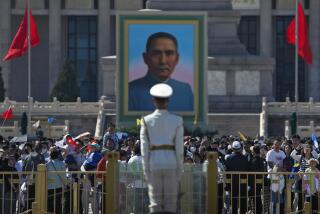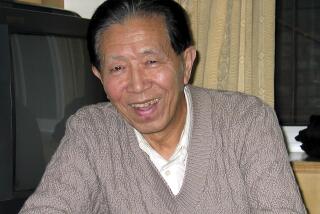China Denies Reports That Jailed Dissident Wei Is Dead
- Share via
WASHINGTON — Amnesty International said Friday that it has received reports from China that Wei Jingsheng, China’s most famous political dissident and crusader for democracy, is either seriously ill or has died in prison.
China today denied that Wei had died.
Wei, 37, the leader of the so-called Democracy Wall movement of the late 1970s, was convicted of “counterrevolutionary crimes” on Oct. 16, 1979, and was sentenced to 15 years in prison. He has been in jail or labor camps ever since.
“I’m not sure where he is, but as we understand the situation, he has not died,” Wang Lixian, an official of the Ministry of Justice, said this morning in Beijing.
Wang said that ministry officials had inquired into Wei’s situation after being asked about Amnesty International’s report and had confirmed that “this has not happened.” He declined to give any other information about Wei.
In a message to Premier Zhao Ziyang, Amnesty International said it had repeatedly asked the Chinese government about reports that Wei was seriously ill and had requested his unconditional release and medical treatment for him, the Associated Press reported from London.
The London-based human rights organization said Friday that it had received reports that Wei has died and appealed to China to release information about his fate.
Chinese officials have repeatedly refused to allow correspondents or other foreign observers to meet with Wei or to provide details about his confinement.
In the late 1970s, as China began to recover from the ravages of the Cultural Revolution, Wei emerged as spokesman for an outspoken group of younger Chinese who argued that the nation must change not only its centrally planned economy but also its political system.
Wei, an electrician at the Beijing Zoo, became the editor of Exploration magazine, one of a number of unofficial publications that cropped up during that period.
At the time, China’s Communist Party leadership was urging the nation to join a campaign for “the four modernizations”--a massive overhaul of China’s industry, agriculture, science and technology, and national defense. Wei’s best-known essay, “Democracy: The Fifth Modernization,” argued that China could not possibly modernize without opening up its political system to permit dissent.
Wei and other advocates of political democracy were given some official encouragement in 1978, at a time when Deng Xiaoping, then a vice premier, was in the midst of a battle with Mao Tse-tung’s handpicked successor, Hua Guofeng, for control of the Communist Party.
But in 1979, after Deng had consolidated his control over the party leadership, the regime cracked down on the budding democracy movement. Wall posters and publications “opposed to socialism and to the leadership of the Communist Party” were banned and Wei and several other advocates of democracy were arrested.
After a seven-hour trial in a closed courtroom, a judge ordered Wei imprisoned “in order to consolidate the dictatorship of the proletariat, safeguard the socialist system, ensure the smooth progress of socialist modernization and punish counterrevolutionary criminals.”
According to Amnesty International, Wei was held for several years in solitary confinement in a Beijing detention center. The group said that in 1984, Wei was moved to a labor camp in Qinghai province, the remote western area that is sometimes called China’s version of Siberia.
Times staff writer David Holley in Beijing contributed to this story.
More to Read
Sign up for Essential California
The most important California stories and recommendations in your inbox every morning.
You may occasionally receive promotional content from the Los Angeles Times.










